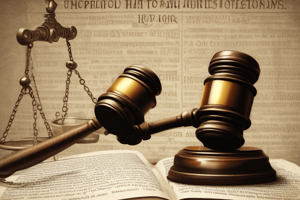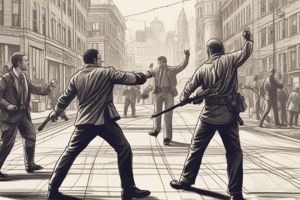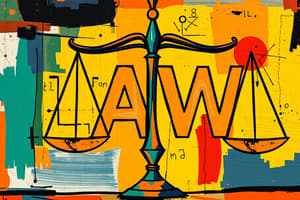Podcast
Questions and Answers
What is the primary purpose of Penal Law?
What is the primary purpose of Penal Law?
- To define the procedures for making arrests
- To provide training for law enforcement officers
- To resolve disputes between individuals
- To achieve order in society by defining crimes and their consequences (correct)
What is the main difference between a Petty Offense and a Crime?
What is the main difference between a Petty Offense and a Crime?
- The jurisdiction where the offense was committed
- The severity of the punishment (correct)
- The type of conduct involved
- The age of the offender
What is the purpose of a Penal Law in relation to the public?
What is the purpose of a Penal Law in relation to the public?
- To punish offenders
- To educate the public about the legal system
- To provide a warning to potential offenders (correct)
- To raise revenue through fines
What is the key distinction between a Misdemeanor and a Felony?
What is the key distinction between a Misdemeanor and a Felony?
What is the purpose of defining Physical Injury in the law?
What is the purpose of defining Physical Injury in the law?
What is the role of Penal Law in preventing offenses?
What is the role of Penal Law in preventing offenses?
What is the primary focus of Criminal Procedure Law?
What is the primary focus of Criminal Procedure Law?
What is a key feature of a Violation?
What is a key feature of a Violation?
What is considered a Serious Physical Injury (S.P.I.)?
What is considered a Serious Physical Injury (S.P.I.)?
What is a Deadly Physical Force (D.P.F.)?
What is a Deadly Physical Force (D.P.F.)?
What is a Deadly Weapon?
What is a Deadly Weapon?
What is required for Criminal Liability?
What is required for Criminal Liability?
What is the definition of Strict Liability?
What is the definition of Strict Liability?
What is Criminal Solicitation?
What is Criminal Solicitation?
What is Criminal Facilitation?
What is Criminal Facilitation?
Study Notes
Penal Law
- Aims to achieve order in society by defining forbidden conduct and consequences
- Gives fair warning of proscribed conduct and its consequences
- Differentiates between serious and minor crimes
- Provides for a public response to particular offenses, including consideration of the victim and community
Difference Between Criminal Procedure Law (C.P.L.) & Penal Law
- C.P.L. outlines the procedure for making arrests with warrants, while Penal Law defines crimes and consequences
Key Definitions
- Law: a rule adopted by a competent authority that prohibits, commands, or regulates acts or modes of conduct
- Offense: any conduct for which a person may be fined or imprisoned
- Petty Offense: a violation or traffic infraction, punishable by a fine or imprisonment of up to 15 days
- Crime: a misdemeanor or felony
Types of Crimes
- Misdemeanor: an offense punishable by imprisonment of up to 364 days
- Felony: an offense punishable by imprisonment of over one year
Physical Harm
- Physical Injury (P.I.): impairment of physical condition or substantial pain
- Serious Physical Injury (S.P.I): physical injury that creates a substantial risk of death or causes death or serious disfigurement
- Deadly Physical Force (D.P.F.): physical force capable of causing death or serious physical injury
- Deadly Weapon: a loaded weapon capable of causing death or serious physical injury
- Dangerous Instrument: an instrument capable of causing death or serious physical injury
Criminal Liability
- Requires a forbidden act or omission, and the defendant was physically able to perform a required act
- Strict Liability: mere doing of the act is enough to make the actor punishable, regardless of mental state
- Culpable Mental State: intentional, reckless, criminal negligent, or knowing mental state
Criminal Acts
- Criminal Solicitation: causing a person to engage in criminal conduct
- Conspiracy: agreeing with one or more people to engage in criminal conduct
- Criminal Facilitation: rendering aid to a person who intends to commit a crime
Studying That Suits You
Use AI to generate personalized quizzes and flashcards to suit your learning preferences.
Description
This quiz covers the basics of criminal law, including statutory law, prohibited conduct, and the consequences of committing crimes. It also explores the differences between serious and minor crimes.




